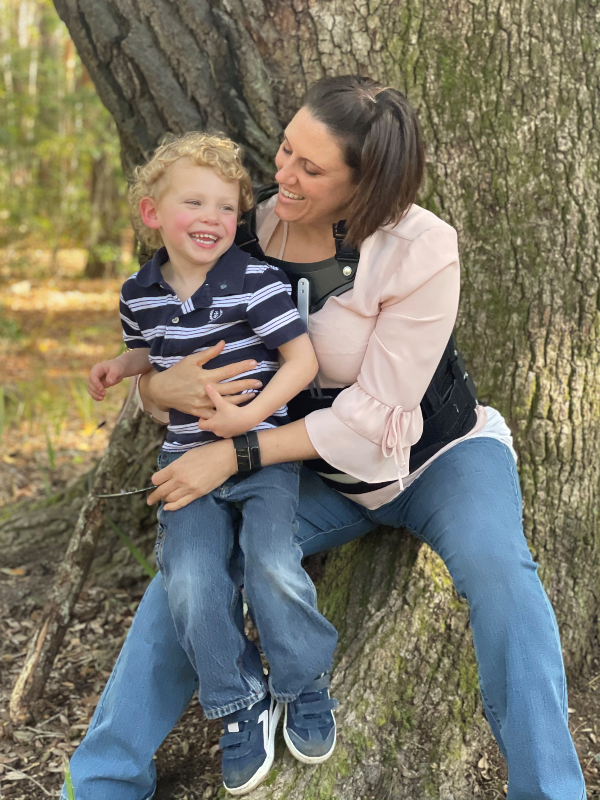Wellness Coaching Helps Veteran Stay Active After Back Surgery

Navy veteran Deborah Tucker would like to play on the floor with her three-year-old son Logan without feeling pain.
A spinal fusion in her lower back and a debilitating autoimmune disease present a double challenge to the simple things she would like to enjoy.
Shortly after retiring from the Navy after 20 years of service, she turned to Wounded Warrior Project® (WWP) to help her navigate an arduous recovery after doctors fused part of her spine due to long-standing injuries and disease complications.
Deborah is not alone; back issues are among the top five health concerns for veterans. According to a 2020 WWP survey of the injured veterans it serves, 74% of warriors report having back, neck, and shoulder problems as a result of their military service.
Reducing back pain and increasing mobility are big reasons WWP’s Physical Health and Wellness program offers wellness coaching to warriors with all ability levels. The 12-week wellness coaching program’s goal is to provide safe and effective ways to improve overall health.
“For warriors, there is often fear of exacerbating a pre-existing injury or incurring more injuries,” WWP wellness coach Shena Faith said. “In the coaching program, we focus on teaching proper form and alignment, allowing for safe movement. A warrior once said to me, ‘I finally realized that I’m injured, not broken,’ after completing the program.”
WWP’s wellness coaching emphasizes regular exercise and increased mobility that can lead to decreased pain, less injury risk, lower stress levels, more self-confidence, and better quality of life.
Warriors and their coaches also discuss movements they can incorporate into their everyday routines to improve mobility and decrease pain.
Learning Patience with Herself
For Deborah, improving mobility has been about making small changes and being patient with herself.
That’s not easy for a former Navy aircrewman who’s used to pushing herself. It didn’t help that she was diagnosed with lupus, an autoimmune disease that compounded her back pain with inflammation and possible nerve damage around the time she was contemplating retirement. With an energetic three-year-old son, Deborah felt that she didn’t have time “to sit on the couch and wallow in misery.”
Deborah signed up for wellness coaching with WWP in December 2020 and completed the initial virtual health clinic.
Shortly after, a follow-up doctor’s visit revealed her fused spine was not producing new bone growth and not healing as hoped.
“I talked to my wellness coach about it because I knew I needed to work out but would have to be very careful,” Deborah said. “My Wounded Warrior Project coach helped create plans that allowed me to work out and prevented further injury.”
Deborah is taking small steps to regain physical activity. Still, she reminds herself to walk before she can run again. She has always been physically fit and was an avid runner before her injuries and medical diagnosis, placing in the top 10% at her first Gate River Run 15K in Jacksonville, Florida.
“Sometimes, I would run two half marathons per season in Florida. I don’t know how else to live than to run.”
In March 2021, even though it was only months after her spinal fusion and she was still wearing a back brace, Deborah managed to walk her own version of the Gate River Run. “I decided that walking the event virtually this time would allow me to go at my pace and avoid obstacles like steep bridges,” Deborah said. “I have the determination to do it, but I’m not physically able to do it yet. That was a hard lesson for me to learn, but I realize I don’t have to give up the things I love; I just find a new way to do them safely.”
That determination is ingrained in Deborah. She joined the Navy after high school and served for 10 years as a P-3 flight engineer and 10 years as a career counselor. “As an aircrewman, I ignored pain and other medical issues for fear it might disqualify me from flying,” Deborah said. “It wasn’t until I switched jobs that I felt comfortable discussing my medical concerns with my doctors.”
She has advice for fellow servicemen and women: “If you sacrifice your health for any reason, you’re sacrificing your quality of life in the future. You have to be smart about prioritizing your health. Your family and your health are what you’ll have at the end of the day after you sign your DD214 and finish your service.”
While working on her health, Deborah is looking forward to finding employment in the civilian world and playing with her son pain-free. “I’m learning small modifications that can help me do important things with minimal pain,” Deborah said.
Learn more about WWP’s in-person and online wellness coaching for warriors.
Contact: Raquel Rivas — Public Relations, rrivas@woundedwarriorproject.org, 904.426.9783
About Wounded Warrior Project
Since 2003, Wounded Warrior Project® (WWP) has been meeting the growing needs of warriors, their families, and caregivers — helping them achieve their highest ambition. Learn more.